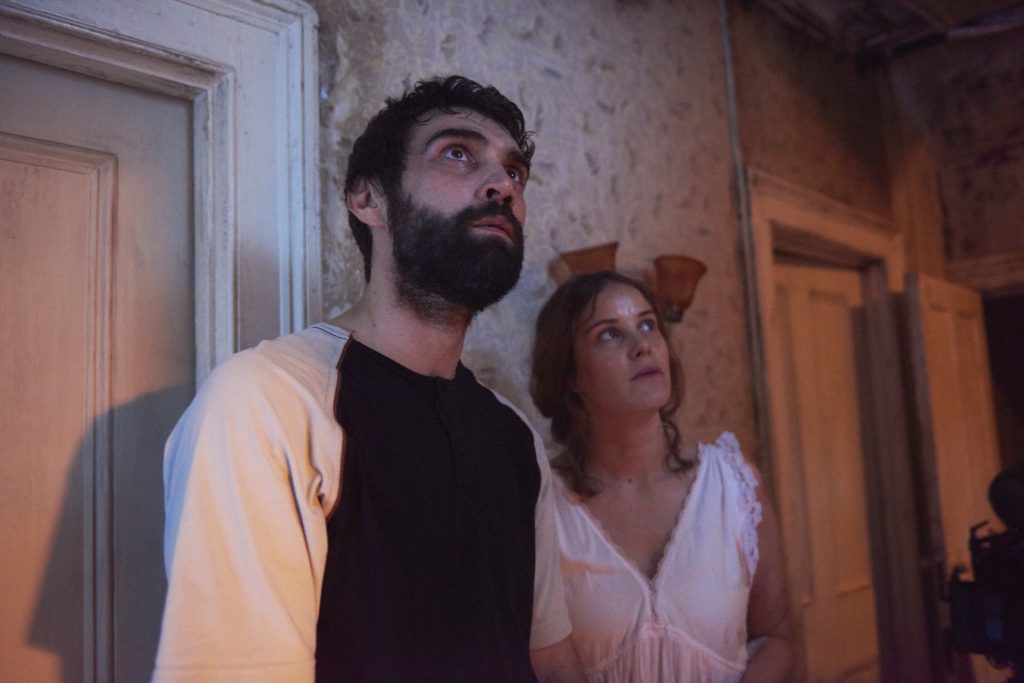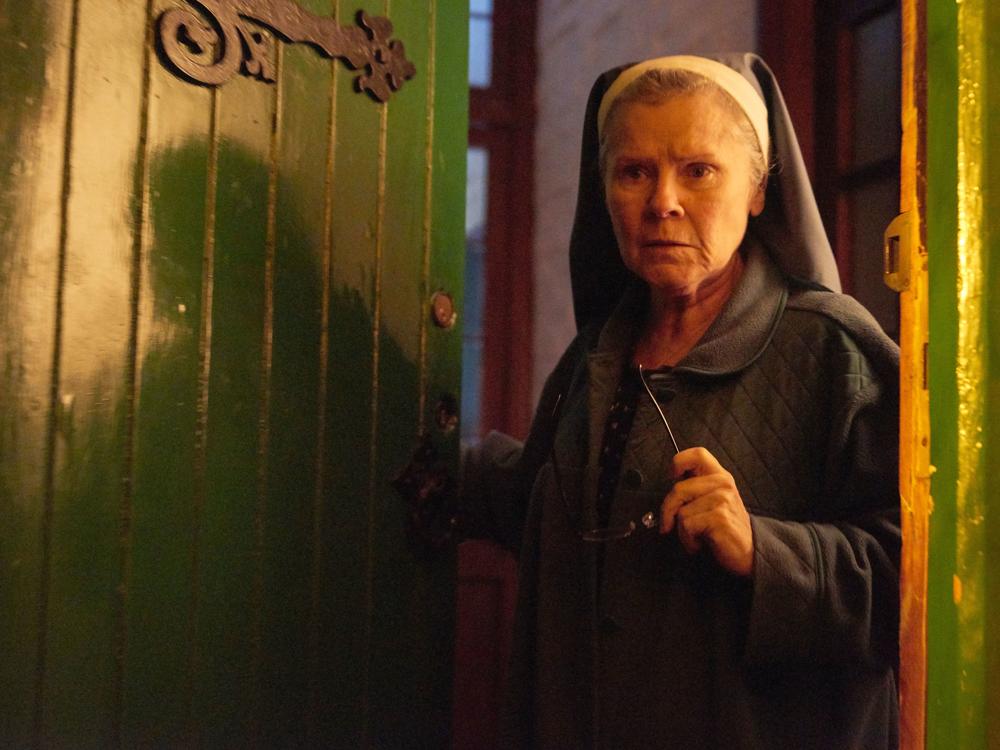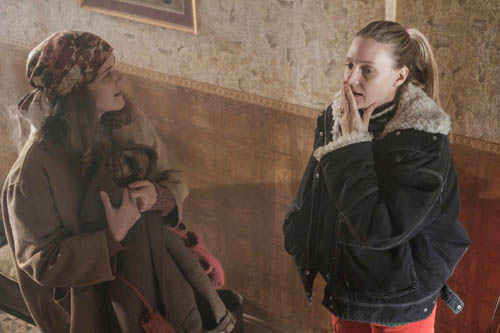The prolific actor Romola Garai first demonstrated her ability as a filmmaker with Scrubber, a gripping 20-minute feminist drama about a young middle-class mum and homemaker (Amanda Hale) who escapes her deadly routine through bouts of anonymous countryside sex; thematically, it anticipated the current critical favorite The Lost Daughter by nine years.
Amulet, Garai's first feature as writer-director, builds substantially on that promise. A neo-Gothic horror film, it tells the story of an educated European refugee Tomaz (Alec Secăreanu), who’s surviving in London by taking dangerous building renovation gigs. Nightmares and flashbacks reveal he’s a former soldier who, as a solitary wartime guard at a forest outpost, perhaps in the Balkans, cruelly abused the trust of a fleeing woman (Angeliki Papoulia) for whom he’d provided shelter.
After his London squat is gutted by fire, Tomaz is conveyed by a mysterious nun (Imelda Staunton) to a mouldering house where he’s told he can live rent free if he fixes it up and helps Magda (Carla Juri), the enigmatic young woman who lives there. She has a charge of her own, her mother (Anah Ruddin). This madwoman in the attic is of a different calibre to the one in Jane Eyre – and not simply because she spawns livid bats that resemble the small ancient effigy of a fertility goddess Tomaz had unearthed in the forest.
As Amulet turns phantasmagorical and Tomaz pays the piper, so Garai’s broodingly Angela Carter-ish fable explicates its rage. She talked to theartsdesk on a Zoom call.
 GRAHAM FULLER: How did you conceive the idea of making a modern Gothic horror film that would express the horror of rape?
GRAHAM FULLER: How did you conceive the idea of making a modern Gothic horror film that would express the horror of rape?
ROMOLA GARAI: I suppose the fact of being born female and living in a patriarchy…you know, my screenplays are saturated with that. I've always been a big horror fan, and the screenplays I was writing were very dark. Because I hadn't acted in a horror film, the thought of writing one felt slightly out of my wheelhouse, like I’d be stretching myself an uncomfortable amount. But when someone suggested it to me, partly because we’re living through a new golden age of horror, I thought, “Well, I'll have a go". And then I wrote it and it was optioned very quickly. We were in development for a relatively short amount of time and were in production 18 months later. The whole journey was much quicker and smoother than any of the other opportunities I’d had to develop a screenplay. (Pictured above: Alec Secăreanu, Carla Juri)
Did the idea for the film predate the #MeToo movement, or did they coincide?
I wrote it before the first stories started to come out, and when they did we were having our development meetings. People were going, “Oh, this story’s appropriate for the times". But I do sometimes wonder what would’ve happened if I'd try to pitch this film 10 years ago. I would've probably been told, “Get out and take your disgusting screenplay with you".
Did the realistic elements of the story come first, or did you set out to write a parable?
I was interested in character tropes. If you write a horror film and make the protagonist female, there's a potential for people to take a voyeuristic delight in seeing her tortured, which is the problem with rape revenge films. I decided to make the protagonist a man because that gave me an opportunity to write about what a hero is in horror films. Usually he comes and saves a woman, just as men in war are often supposed to come and rescue women. In fact, in times of conflict, men often exert control over women they’re meant to protect and present a huge threat to them. I was interested in playing with audience expectations by having a male hero you think has come to help this woman. Everyone's willing him on this journey to save her, and then you realize it's considerably more complex than that.
In order to take us on a journey with Tomaz, you make him quite sympathetic and he does convince himself he's going to protect Magda. But then you subvert it, don't you?
Yes. Tomaz understands the difference between right and wrong on a completely conscious level. I think that’s true of a lot of situations in which people are given the opportunity to behave badly. It's not that they abandon their moral code, it’s that they place it gently to one side while they do bad things.
I guess the point for me is that men who do terrible things to women in war are not always bad men. They act that way because of opportunity rather than because of character. I'm interested in the idea that men who revere women are often more of a danger to them than men who are overtly misogynistic. There's an innate problem in wanting to help people sometimes, because it disables them and builds up your own ego. That’s the story of male–female relationships a lot of the time.
 The nun played by Imelda Staunton (pictured left), who brings Tomaz to Magda, clearly exists in a parallel universe. Is it OK with you if audiences twig early on that the film is an adult fairytale or fable?
The nun played by Imelda Staunton (pictured left), who brings Tomaz to Magda, clearly exists in a parallel universe. Is it OK with you if audiences twig early on that the film is an adult fairytale or fable?
Absolutely. I had to set up the fairytale motifs – which come from our earliest memories of the existential relationships of heroes, vulnerable women, and older women – in order to do something playful with them. I love fairy tales and Gothic tales, and I think they're useful and important for people who want to ask hard questions of the audience about tropes like the madwoman in the attic, or the older woman who poses a threat. With drama, you hopefully avoid those kinds of tropes, but that means you end up not questioning their existence. In a fairytale space, you have an opportunity to explode them.
Do you think Tomaz is beyond hope?
I do. It’s my belief people can’t really move forward unless genuine recompense is made. I think the anxiety around rape revenge movies is often misplaced because the anxiety should be, why do women have to live in fear all the time, particularly in times of conflict. The impulse to redress that balance is a human one and a healthy one, I think, because if that impulse wasn't there it’d mean [we’d] become completely conditioned to a life of submission, and that's obviously wrong.
The film is drenched in imagery and symbolism. What were your visual touchstones?
In terms of films, there was a bit of [David] Lynch – Eraserhead, for sure. Quite a bit of [David] Cronenberg, like The Fly, with its bodily transformation. And [Andrzej] Żuławski’s Possession because it’s a horror film about a relationship going through a big transition. But also Trouble Every Day [directed by Claire Denis] for its uniquely European quality, and Hellraiser [directed by Clive Barker] because it’s distinctly British.
We also looked at lots of medieval and Renaissance Virgin Mary paintings and quite a few in the chivalric mode because we were considering what the hero represents in the story. Brueghel, also. When we were building up the mythology around this cult or religion that Magda turns out to be the deity for, we looked at neolithic art – fertility statues, early cave paintings, and early images of women that potentially – though no one really knows – have a kind of religious symbolism.
What was your learning curve making the film?
Oh, where to start? [laughs] It was thousands and thousands of lessons learned every day. That’s what directing a first film is, isn't it? I suppose the most useful thing I took from it – and it sounds silly and obvious – is that editing is an outsized part of how you construct your narrative. If the script is 40 per cent, then editing is 40 per cent, too, and the shooting is 20. I spent eight years practicing to become a writer, but I went into the edit suite with virtually no experience, just the three days it took to edit my short. We had almost no footage on that anyway so there wasn’t much editing to do. (Pictured below: Garai, right, on set with Carla Juri)
 I was very lucky to be able to work with Alastair Reid, who’s a highly experienced, accomplished editor and was very receptive to my ideas. We tried everything I thought was a good idea. Even if it turned out to be nonsense, he never shut me down. I basically had to learn how to tell a story visually, and how to go through the process of learning that things that work on the page don't necessarily work on film, including things you wanted to work but couldn't get the right shots for.
I was very lucky to be able to work with Alastair Reid, who’s a highly experienced, accomplished editor and was very receptive to my ideas. We tried everything I thought was a good idea. Even if it turned out to be nonsense, he never shut me down. I basically had to learn how to tell a story visually, and how to go through the process of learning that things that work on the page don't necessarily work on film, including things you wanted to work but couldn't get the right shots for.
You write the script alone. You make the film with 60 other people, but you are still alone. Then you enter into this dynamic with one other person where you're essentially making a piece of work together. It's a very cool creative partnership, and I hadn't done anything like that ever in my life.
As a writer-director, are you going to move away from horror now?
I will move where the opportunities are! I would love to make another horror film. I have other scripts and one of them has got more creature work in it – I love creatures. I’ve written screenplays in a number of other genres, but I do enjoy working in an elevated space. There’s something about it that makes it much easier to tell stories that subvert traditional relationships in a place where people understand what the characters are and what they're supposed to be doing.
You’ll continue to act presumably?
Yeah! If I’m honest, I don't really know how filmmakers balance the books. I dunno how they do it [laughs]. I love acting and would never not want to do it, but I also have to support my family. So, yes, it's still very much a big part of my life.















Add comment